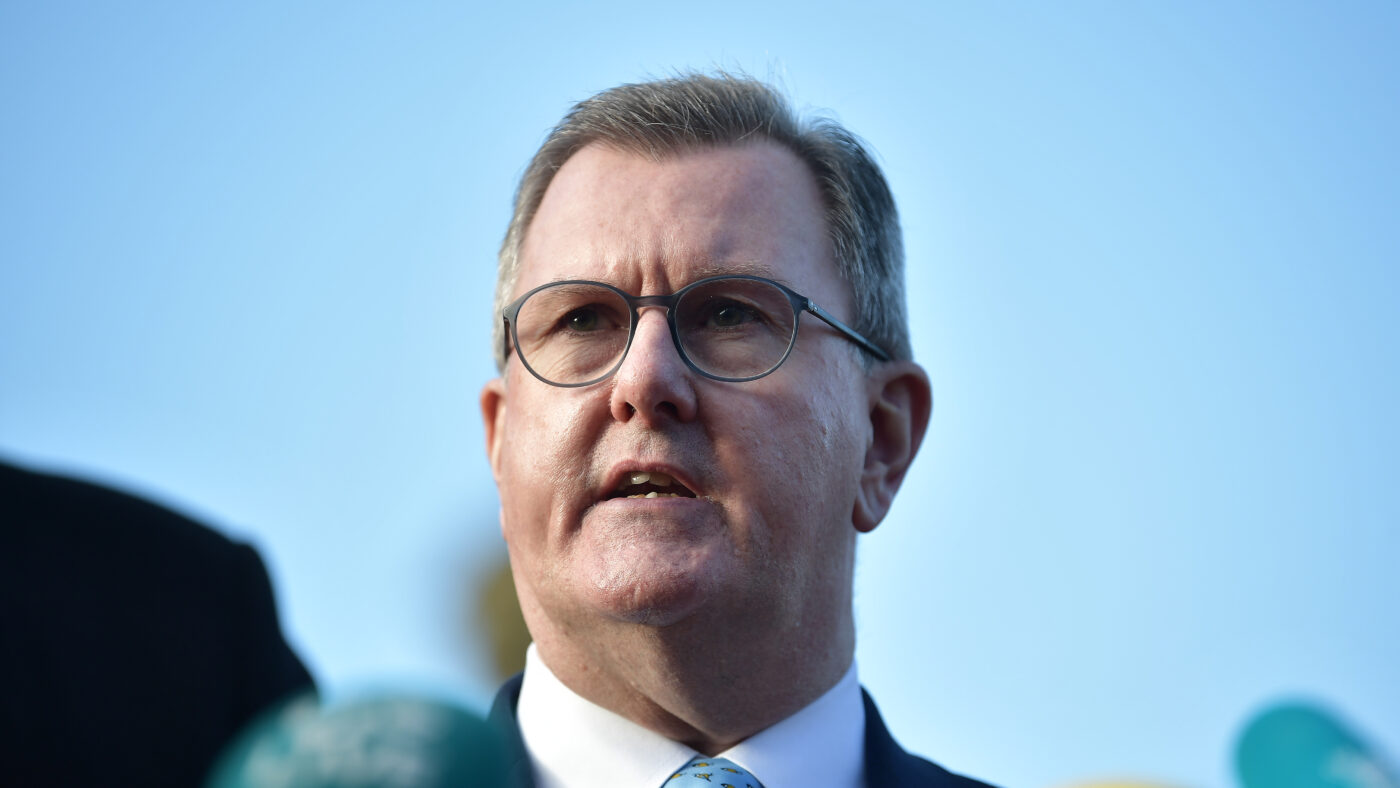Last week, the BBC reported that the DUP’s officer team was finally, definitively, going to vote ‘yay or nay’ on whether to accept the government’s offer on the Windsor Framework and restore power-sharing in Northern Ireland. Needless to say, that did not happen.
The party’s leader, Sir Jeffrey Donaldson, has spent months talking up the idea that Stormont would return imminently. Yet, on Friday evening, most reports agreed that he did not hold a vote because he didn’t have the numbers to win.
Predictably enough, that wasn’t Sir Jeffrey’s version of events.
According to the DUP leader, the meeting in question had never been ‘make or break’. There were always ‘outstanding issues’ to finalise with the government and leaks suggesting that his party was about to make a decision were ‘factually inaccurate’.
Whichever account you believe, the situation in Northern Ireland is becoming ever more farcical and confused.
After all-party talks about Ulster’s finances before Christmas, the government claimed that its negotiations with the DUP were over. Donaldson, in contrast, remained adamant that he was still ‘engaging’ with ministers, making ‘progress’ and closing ‘gaps’ between his party’s position and that of Westminster.
Yesterday, the province’s secretary of state, Chris Heaton-Harris, effectively provided the DUP with two extra weeks to reach its verdict. He was supposed to call an election if an executive was not formed by the 18th of January, but that deadline has now been extended by short-term legislation to the 8th of February.
So, why is this dispute generating so many contradictory claims?
It’s been obvious for some time that many influential politicians within the DUP, including its leader, are keen to get back to Stormont. The party brought the executive down in February 2022, because it was required to implement aspects of the Irish Sea border, but it has always unmistakably enjoyed the perks and powers of devolution.
The problem is that, although Chris Heaton-Harris claims the government’s proposed deal is ‘generous’ and Donaldson says it represents ‘progress’, almost nobody else believes it will solve the constitutional and economic problems that caused the DUP to boycott power-sharing. A group of senior DUP figures, including MPs, is reportedly dismayed that the party could return to the Assembly on a flimsy pretext, with the sea border still in place and largely unchanged.
The government’s offer, to be fair to Donaldson, has not yet been published officially, but last week the Daily Telegraph reported a leaked version of what it claims the two sides negotiated. According to the paper, officials didn’t even ask the EU to reopen the Windsor Framework, but instead held ‘secret talks’ on the scope for ‘wriggle room’ on its implementation.
The ‘green lane’, which is supposed to allow British goods to enter Northern Ireland with slimmed down bureaucracy, may become marginally easier to use under these proposals. There are also almost laughable suggestions that it could be renamed the ‘UK Internal Market Lane’, to reassure unionists. In addition, ‘ministers had prepared legislation offering to protect Northern Ireland’s place within the UK, a £3.3bn financial package and a new East-West council to bolster intra-UK ties.’
None of this addresses the central problem, that the province’s market for goods, unlike the rest of the UK, remains bound by EU regulations. Under the Northern Ireland Protocol, which the Windsor Framework entrenched rather than mitigated, Brussels’ authority reaches into every nook and cranny of Ulster’s economic life, and often affects other areas as well. Critics of the Rwanda Bill, for instance, believe that the legislation will create a new border in the Irish Sea, this time for people.
Every time the EU makes new rules, or the UK diverges from them, Northern Ireland is pushed further from the British mainstream. And far from challenging those problems effectively, or at least acknowledging that they exist, the government has ignored, denied and even exacerbated them.
Today, the Telegraph reported that Rishi Sunak was at least prepared to screen Westminster legislation so that it did not ‘create extra barriers in the Irish Sea’. However, most divergence comes from the relentless tide of EU law, like a ban on silver fillings that the British Dental Association warned last week, ‘threatens the future of NHS dentistry in Northern Ireland.’
All this damage, remember, was inflicted by a government that purported to be Conservative and Unionist. It is incredible, not that the DUP has hesitated so many times before accepting another potentially dud offer, but that the party is prepared to consider conceding its constitutional objectives, in order to claim some form of victory from ministers who have persistently misled them before.
Admittedly, in the wake of widespread public sector strikes in the province, the DUP is worried that it will be blamed for delaying long awaited pay awards and the degeneration of services. Some unionists maintain that the boycott boosts the claim that Northern Ireland simply does not work as part of the UK and encourages voters to explore the case for Irish separatism.
It’s not a trivial argument and many people are certainly frustrated that the gap in governance has been allowed to persist for so long. Doctors, nurses and schoolteachers are among the workers who have waited for years to get pay rises that have long since been awarded in the rest of the country.
At the same time, if the DUP claims that an ineffective deal meets its tests for returning to Stormont, voters will be sceptical and judge its tactics a failure. That outcome could also scupper any chance of unionists ever challenging the sea border effectively in the future.
Sir Jeffrey Donaldson at least owes his supporters honesty about what his party has achieved, and what it has failed to address, even if he decides, ultimately, to return to devolved government.
Click here to subscribe to our daily briefing – the best pieces from CapX and across the web.
CapX depends on the generosity of its readers. If you value what we do, please consider making a donation.


